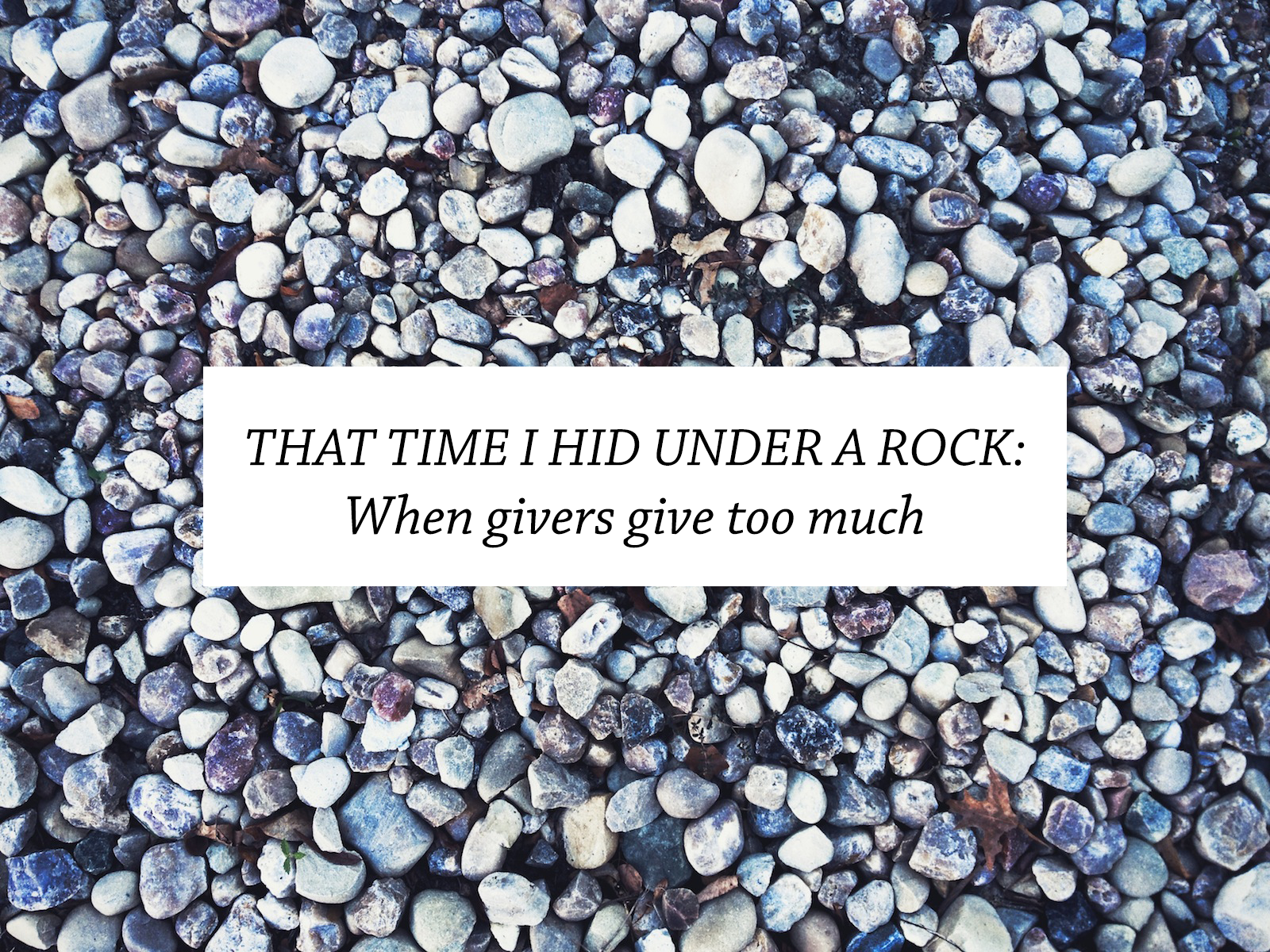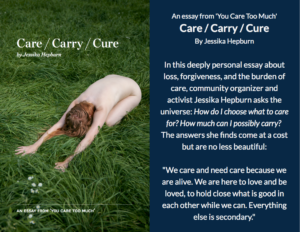

Sometimes I wonder if I’m meant to be a participant in this great internet that I love. Maybe I’m wired funny, or something.
I’ve noticed a consistent pattern over the past 8 years of internet life. I will pour myself into sharing my life and what I’ve learned with others. I will share on my blog, email with people, tweet and facebook with them. I will teach a class or start a project for others to participate in. I will immerse myself in the amazing global internet community. I will exult in my feelings of connection and contribution.
And then something happens. I get tired and overwhelmed. After a while, I start to retreat. I stay quiet for a little while – a month, sometimes more – focusing entirely on my work and projects and not venturing much out into the wide internet world. Then when I’m ready, I enter back into the conversation, recharged and ready to start giving of myself again.
I could chalk this up to being a Highly Sensitive Person, or an Introvert, or an INFJ. All of these things are true. But none of them make me any happier with the result.
There’s nothing wrong with following this pattern of giving, giving, giving, and then retreating, retreating, retreating. It works well for some people. But bouncing back and forth between being “present” and “distant” is confusing for me, and probably for others. It feels like hugging all the people to my chest for a while, and then slowly backing away to recoup. Then starting all over when I come back.
This pattern also makes it hard to maintain momentum in getting my creative work into more hands and hearts. Though I’m grateful for what I’ve been able to accomplish, I can’t help but feel that my start, stop, start, stop patterns have held me back from being able to see greater potential in each of my creative endeavors.
Turn left to go right (Or, that time when the best thing to do was EXACTLY THE OPPOSITE of what I thought)
Lately, I’ve experienced a surge of “sharing” energy that is coming on after a six-month reclusive spell. I’ve started a new blogging project, put together a new mailing list, and I’m contributing to more creative communities. The relief I feel at coming out of this most recent period of withdrawal is spurring me to look for a better solution to social renewal than “disappearing from the internet”.
In the book Give and Take: A revolutionary approach to success by Adam Grant, I read a fascinating story about Conrey Callahan, a young teacher who wanted to to make a difference in low-income communities. After pouring herself into her students for years, she finally hit rock bottom. “I was burned out, overwhelmed, and ready to give up.”
Of course, I’m no Conrey Callahan. I don’t spend my days breaking up fights, tracking down truant students, and praying for my survival. But what was interesting about this story was that Conrey found a way to avoid staying burnt out, and in fact found more energy to serve than she ever had before. And the answer (surprisingly) wasn’t to give herself more “me” time.
What Conrey did instead was to start giving more. On nights and weekends, she began volunteering her time, both as a mentor to other teachers in similar situations, and as a co-founder for a national non-profit organization that helps high-achieving, low-income kids get ready for college.
All in all, she spent ten extra hours a week giving to projects that had observable results. As a result, Conrey’s energy returned and she was newly inspired in her role as an educator, making her one of the longest-serving and most impactful teachers at her school, and eventually leading to her nomination for a national teacher award.
Oh, the screens that stand between us
Grant’s theory is that we don’t get burned out by giving too much – we get burned out when we feel like all our hard work is not making a difference in people’s lives. When we don’t see results, it’s hard to continue to show up and give of ourselves.
Sharing what we know with others on the internet may not be as emotionally and physically demanding as working in an inner-city school, but sometimes it can leave us with that same feeling of “am I making a difference?” After all, I don’t have the benefit of seeing your face as you’re reading this. I will probably never know the impact my words have in your life.
Add to that the sheer abundance of words, images, and video that are filling up all of our news feeds every day, and I can start to wonder if my voice really matters. Am I being a contribution, or a drain of someone’s time and energy? Even though I firmly believe that we make each other stronger when we share our lives and what we’ve learned, that niggling voice starts to whisper. And sometimes I listen.
It’s tempting to believe that more numbers will solve this problem. If only we had X amount of people in our communities, our work would be validated, and we would *know* that we were making a difference. But I know this is not true. I’ve worked with people who felt this disconnection and doubt when they had 100 readers, and when they had 100,000 (yes, seriously; “I only have 100,000 email subscribers” is something a client has actually said to me; once I pointed out that this wasn’t actually a problem, it became a running joke).
An experiment in tracking meaningful progress
I’m not entirely sure how to fix this problem; I’m hoping that we can figure it out together. But I have some ideas.
First, we need to find ways to visualize the impact that we’re having.
Technology can help us do this. For example, the mailing list program that I use has a handy map for visualizing readers as they open your emails. I don’t recommend staring at tools like this for hours because it can get addictive, but it is so helpful to see people digesting your words all over the globe in realtime. The analytics tool that I use also has this feature. You can see a map of people popping in and out of your website all over the globe.
If you don’t use tools like these, you can visualize it in your head. If you know you have 279 blog visitors every week, imagine standing in front of a room and speaking your words to those 279 people. That is essentially what is happening every time you put your work into the world. This can help you get off the cycle of “I don’t have enough readers” and really “see” how much of a reach sharing your life and wisdom actually has.
Second, don’t discount the thanks that you get from people; instead, record it.
I have a habit that has been attributed to impostor syndrome– discounting praise whenever I receive it. I’m now working on changing this habit and turning it into proof of my progress.
Once a week, I’m also recording the things people said to me about how my work affected them that week. For example, last week an email that I sent inspired someone I respect to start his own mailing list. Another friend told me that the prompt I’m using to keep me blogging regularly is becoming a part of her daily journaling ritual.
Stories like these make me realize how incredible it is to be able to share life with other humans, and that sharing ourselves, no matter how slow-going it may seem sometimes, sparks courage, love, and creativity in each other.
Third, consider spending more time making contributions that give you observable results.
For example, I’ve decided to experiment with blogging every day. Not only is it easier to do something every day than it is to do something less regularly, but blogging every day is also much more likely to give me observable results than my previous track record of blogging maybe once a month. My goal is not to hit any specific numbers, but to see some proof that my work is a gift that people want to get.
It’s ironic that pouring out more of yourself can actually give you more energy, but this has been a huge turning point in my thinking. I have to make sure that the more I am giving is actually aligned with how I want to be spending my time and that I am seeing results from it; otherwise, it drains my energy instead of sustains it. This is why it’s important for me to use tracking tools so I can have solid evidence of my progress.
I’m interested in finding other ways to renew my energy and capacity for sharing with others (that do not involve hiding under a rock for six months). Have you found anything that works for you? I would love to hear (I’ll be responding in the comments). <3
 Meet Sarah J. Bray
Meet Sarah J. Bray
Sarah J. Bray is resident nation-builder at &yet and writer, teacher, and maker-of-side-projects at sarahjbray.com. She loves toast, idealism, and good people like you.


[…] Wise words stated by Sarah Bray in her amazing article that I read last week. Catch the whole post HERE. […]